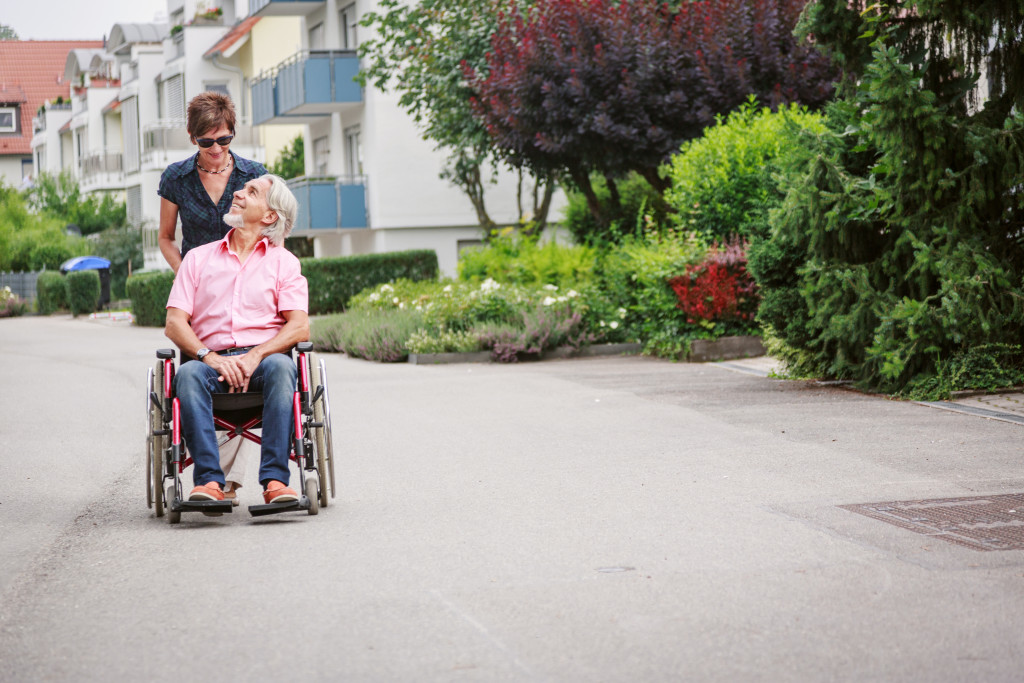- Create a comprehensive care plan including medical needs, lifestyle habits, physical health, mental health, and social activities.
- Ensure regular checkups with primary doctors and specialists and recommended screenings such as mammograms or prostate exams.
- Encourage seniors to engage in social activities like joining clubs and organizations, taking walks outdoors, or attending church services.
- Offer hobbies and interests to keep seniors active, connected with the community, and fulfilled.
In 2020, according to the US Census Bureau, there are already 56 million seniors in the country. The figure represents about 17 percent of the total population. And as each baby boomer continues to enter their golden years, this number will only increase to 73.1 million older folks, or 21 percent of the population, by 2030. Their advanced age makes it necessary for their families to help take care of them.
As a family member, taking care of your senior loved one’s health can be challenging. It is crucial to ensure seniors receive the proper medical and emotional care they need to stay healthy in their golden years. With some planning and proactive steps, you can ensure that your elderly relative stays healthy and happy.
Create A Care Plan
Creating a comprehensive care plan for your senior family member is important in ensuring they remain healthy and safe. This should include information regarding their medical needs, lifestyle habits, physical health, mental health, and social activities. It should also list contact information for all the people involved in providing care for them. This will help keep everyone on the same page and ensure everyone has access to the same information regarding their care needs.
Medical History and Health Status
Your care plan should include details about your senior family member’s medical history and current health status. This may include medications, allergies, chronic conditions, recent surgery or treatments, physical limitations, and other pertinent medical information. It is essential to keep this section up-to-date so that everyone involved in the care of your senior family member is aware of their current health status.
Lifestyle Habits and Physical Activity
Your care plan should also include information about your senior family member’s lifestyle habits and physical activity. These habits and activities can include their diet, exercise regime, or other activities they enjoy that help keep them physically active. Consider having a list of recommended activities tailored to their needs and abilities.

Bring Them to a Care Facility
There may be instances where no family member is available to implement the care plan. In this situation, you can bring your senior family members to a reputable residential care home. The care home should provide a friendly environment where seniors are well cared for. The facility should also have the necessary facilities to ensure they feel safe and comfortable. It should also have health professionals on call to take care of any medical emergencies at the facility.
Schedule Regular checkups
Regular checkups with doctors are essential to maintaining good health in senior adults. Make sure that your elderly relative gets regular appointments with their primary doctor as well as any specialists they may need to see regularly. You should also encourage them to get recommended screenings such as mammograms or prostate exams as required by their specific age group or gender.
Take Care of Their Oral Health
Additionally, encourage them to visit the dentist twice a year for cleanings and checkups. Regular checkups are crucial to catch any health problems in their earliest stages, so it is vital to ensure that your elderly relative keeps up with these appointments.
Track Medical Records
Make sure they keep track of all their medical records and bring them to each appointment. This will give their doctor a complete picture of their health history and help them make the best care decisions.
Engage In Social Activities
Seniors need to lead an active lifestyle both physically and mentally. Encourage them to engage in social activities, such as attending church services or joining a local club or organization. These activities allow them to interact with others and build relationships with like-minded individuals.
Explore Nature
Additionally, getting out into nature can be mentally and physically beneficial, so try taking a walk outdoors together or going on a picnic at a nearby park whenever possible. Encouraging more social and physical activities can help keep seniors healthy, happy, and engaged.
Engage in Hobbies and Interests
Finally, ask your senior loved one about any hobbies or interests they may have and look for ways to incorporate them into their daily routine. This will help them stay active, connected with the community, and fulfilled.
Taking care of the health of your senior family members is an important responsibility. But it doesn’t have to be overwhelming. Following the tips above can help ensure that your senior loved ones stay healthy throughout their golden years. With some planning and proactive steps, you can ensure that your elderly relatives remain happy and healthy throughout their retirement years!

